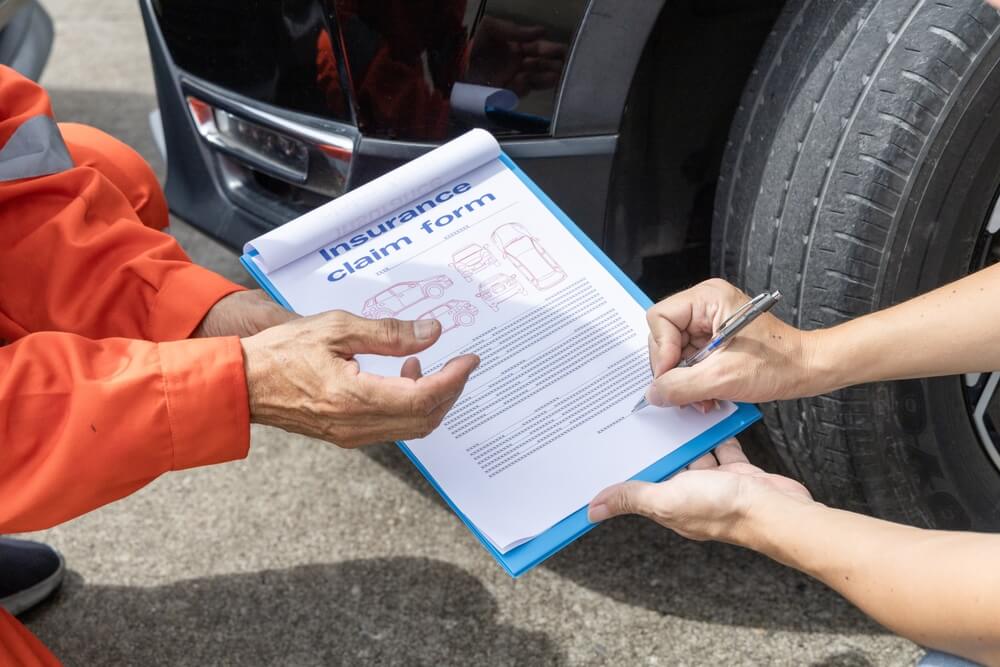Your Step-By-Step Guide to Filing a Car Insurance Claim
Most Georgians rely on their cars daily, making any accident disruptive. In the chaos after an accident, you may be dealing with injuries and the stress of figuring out how your car insurance will assist with repairs. Whether it’s a collision that leaves your car in pieces or a storm that drops a tree on your vehicle, it’s good to know how to file a car insurance claim.
Car accidents are unexpected and overwhelming, but getting back on track may be easier than you think. Our guide to filing an insurance claim explains what to do at the scene, how to navigate the claims process, and tips for handling special situations. With this information, you’ll be prepared to ensure a smooth process and enjoy your fully restored vehicle.
Why Should You Understand the Auto Insurance Claims Process?
As a responsible car owner, you hope your insurance is something you’ll never have to use. Yet, when you need it, knowing how to file a car insurance claim will reduce your stress levels by keeping you informed and ensuring you do everything you can to get fair compensation.
Getting a claim approved requires quite a bit of evidence about the damage that occurred and everyone who was involved. Knowing what to expect will allow you to preserve evidence and help you avoid potential risks that can lead to a denial. Contacting your insurance company as soon as possible is your best bet for getting help with the entire process.
At the Scene: What Immediate Steps Should You Take?
Whether you’re in a fender bender or a major crash, an accident scene is chaotic. Safety is the top priority, so ensure all injuries are addressed. Once that’s done, gathering evidence becomes vital. Following a step-by-step car insurance claim process can help you stay calm and document everything correctly.
- Assess injuries: The first order of business following any accident is to ensure safety and prompt attention for injuries. Are you or your passengers injured? Call for emergency assistance if anyone in your car is hurt.
Check on the occupants of the other vehicle to see if they need medical attention. Once medical needs are taken care of, secure the scene by moving out of the traffic flow, if possible.
- Call the police: While Georgia law doesn’t require you to call the police if nobody’s hurt or property damage is less than $500, it’s always a good idea to alert law enforcement. A police report can be valuable information to submit with your auto insurance claim, and officers can help you secure the scene.
If natural causes damaged your car or you hit a deer or other animal, you may not be required to file a police report.
- Collect Evidence: Take photos of your car and any others involved in the accident. Also, include pictures of damaged property and the general area of the accident. Write down the names, phone numbers, addresses, and insurance information of everyone involved in the wreck.
If police are present, ask for a copy of the police report. When possible, take down the contact information of any witnesses at the scene. If time is available, it’s a good idea to write a summary of the accident while the details are fresh in your mind.
Post Accident Action: What Do You Do Next?
When you’re free to leave the accident scene, it’s time to contact your insurance company if you plan to file a claim with them. Although Georgia is an at-fault state, your insurer will need to know the details about your vehicle’s damage in the event you need to file a claim.
Whether you use an app or call your insurer, make sure you:
- Find out what documents you can submit and learn how to file a car insurance claim form.
- Check your deductible.
- Get information about time limits and deadlines.
- Verify the appointment time and the adjuster’s identity if an adjuster will be coming to assess the damage.
- Document your contact with the insurance company to keep for your records.

Navigating Through the Claims Process
The claims process can feel time-consuming and complicated, but a guide to filing an auto insurance claim can help you stay prepared.
After an accident, file a claim with your insurer or the at-fault driver’s insurance company. When the adjuster investigates, provide as much information as possible to support your claim. They may also offer details about a replacement vehicle while repairs are underway.
To stay informed throughout the process, be sure to get copies of all related documents and ask about follow-up dates.
Dealing With Repair Shops and Rentals
Most insurance companies have relationships with certain repair shops. When you file a claim, you’ll likely be able to choose from a few options provided by the insurer. Upon receiving an estimate, have the mechanic go over the details and explain what it covers. If you’re uncomfortable with the amount, you can ask for a second opinion.
For most Georgia residents, doing without a vehicle until repairs are completed simply isn’t feasible. If you were in an accident caused by another driver, the company’s adjuster will assess your rental needs and advise if the claim covers it. If your policy includes loss of use, your insurer may cover the cost of a rental, regardless of who is at fault.
Aftermath: Following Up on Your Car Insurance Claim
A guide to filing an insurance claim can help navigate the process effectively. Unfortunately, getting compensation from an insurance claim is not immediate. You must stay in touch with the relevant insurance company to track the claim’s progress and learn details as they arise.
If you’re working with a repair shop from an insurer’s preferred list, the insurance company may pay for your repairs directly. This can help speed up the repair process and ensure the insurance company pays for any follow-up issues.
When your car is a total loss, or you’re responsible for paying for repairs, you’ll be waiting for a check from the insurance company. When the insurance company approves your claim, they’ll tell you when to expect your payment.
Special Circumstances in the Claims Process
While some insurance claims are filed and paid without incident, it’s helpful to be prepared when filing an insurance claim. When difficult circumstances arise in the claims process, you may need to provide additional information or submit more forms.
How Do You Handle a Total Loss Scenario?
An adjuster usually considers a car a total loss if the vehicle will be unsafe to drive after repairs are complete or if the cost of repairs exceeds the car’s value. In the event of a total loss, you’ll be responsible for paying off what you owe on the vehicle and finding a replacement.
The type of car insurance you have (and/or that of the at-fault driver) will determine the compensation for replacing your vehicle. If your car is stolen, your insurer will handle the claim. When you’re involved in an accident, and another driver is at fault, their insurance company will handle the claim.
Learning how to file a car insurance claim in these situations can help you avoid delays in the process.
What Should You Do if the Claim is Denied or the Other Driver is Uninsured?
A denied claim or dealing with an uninsured driver can be frustrating. Following a step-by-step car insurance claim approach helps improve your chances of achieving a successful outcome.
If your claim is denied, learning the reason will help you file an effective appeal. For example, if you failed to provide enough information or filled out a form incorrectly, you can fix your mistakes in the appeal. Some people hire a lawyer for extra help getting everything exactly right if the claim is particularly complicated.
When the at-fault driver is uninsured or underinsured, your insurance policy may come to the rescue. If your policy includes uninsured/underinsured motorist coverage, your insurance will provide compensation up to the limits of your policy for car repair or replacement. If you’re unfamiliar with how to file a car insurance claim in these cases, your insurer can provide guidance on the next steps.
However, if you do not have uninsured motorist coverage, you may be out of luck and paying for your repairs and injuries out of pocket. Georgia does not require this coverage, but for its cost, about 5% of your annual premium, it is well worth it.
Final Tips: Ensuring a Smooth Claim Experience
Insurance claims can feel complicated and drawn out. Yet, if you make sure to handle all the details exactly as directed, the whole experience is smooth sailing. These tips will help you get the most from your insurance coverage.
- Don’t wait until an accident occurs to learn about your auto insurance coverage. The type of car insurance you have can help you recover damages in an accident, no matter who is at fault.
- When involved in an accident, take time to gather evidence. Photos, insurance information of involved drivers, a police report, and witness statements can all help you get your claim approved.
- Stay in touch with the insurance company throughout the claims process. Denials often occur because of missed deadlines or lack of information. Staying in the loop can help you ensure everything goes smoothly.
Want An Insurance Company that Makes Filing a Claim Easy? Get a Quote from Velox
Filing a claim may sound like a hassle, but working with the right insurance company is a breeze. Your independent agent at Velox can answer all your questions about car insurance and filing a claim. Call us at 855-468-3569, get a quick quote online, or find a nearby Georgia location and talk to an agent in person.



